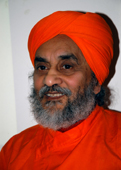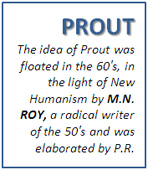

We are presenting some basic concept of PROUT
socio-economicTheory, (PROgressive Utilisation Theory).
These articles, will just give an idea, of the basic contents
of PROUT Socio-Economic theory. For further studies and informations see the publications page.
Ac. Krtashivananda
————————————————————————————————————————————————
Subjects
- The Concept of Humanity and the Values of Life
- Leadership
- The progressive utilisation theory
- Globlisation of economy
- The economic theory of Prout
- Decentralisation of economic power
- The Political Theory of Prout
Excerpts: Articles by Ac. Krtashivananda Avt.
Philosophy in its deepest sense must embody the philosophy of life – human life in its entirety, and not just in part. A theory of life is needed to guide humanity towards its destiny. Other creatures don’t need such theory because they are guided by nature, by instinct.
The aim of philosophy is to suggest and inspire a way of life. Scientific and analytical thought have opened new vistas and dispelled many dogmas. Simultaneously, it must be accepted that this growing scientific and analytic spirit should not destroy and ignore the inner values of life or deny the soul. Humanism needs to be redefined. [continue]
Different psychological classes or varnas dominate the society in successive eras. After the culmination of Vaeshya or capitalist dominance, the second warrior era appears through mass revolution. Although the ruthless economic exploitation comes to an end, intellectual suppression appears in the warrior era of the second order. Now the question arises: how can exploitation by the dominant class of the era be avoided? [continue]
Progress. It is the innate desire of the human mind to move forward from imperfection to perfection and to eliminate all physical and mental obstructions in the movement towards freedom. It is in this striving for freedom that the genesis of social progress lies.
Utilisation. In economic terminology every usable commodity has a utility value and in some cases has an exchange value also.
The Sanctification of Greed Economic oligarchies have conspired to influence the whole world with their slogans of free-market ideology. They are imposing a false idea of wealth, infusing the false concept that money is the main content of life, as well as sanctifying greed and envy in order to amass wealth. They have carefully designed the tools – the International Monetary Fund, the World Bank and the World Trade Organisation – to bring all the nation states under their claws. Their policy is increasing social strife and polluting the environment.
It must be mentioned at the very outset that socialism in the real sense of the term is not merely confined to the abolition of private property and state control of economic activity. True socialism cannot be achieved by neglecting the human aspect. So-called economic freedom is not an end in itself; it becomes a degenerative process if it fails to create an environment of security and justice. Economic progress should not remain dependent on selfishness.
People must be granted the fulfilment of their fundamental right to create sustainable communities and to control their own resources, economies, and means of livelihood. In turn, these rights are influenced by their choice of which cultural values they will embrace. A globalized economy in its present form denies these rights, by transferring the power to make the relevant choices to global corporations and financial institutions. It does not serve human interest.
The great promises of the industrial nations have been broken because of their psychological premise of radical hedonism. Radical hedonism postulates first that happiness can be achieved by the fulfillment of any material or sensual desire whatsoever, and secondly, that in order to fulfill these desires, egotism, greed and selfishness have to be encouraged. This, according to hedonistic belief, will lead to harmony and peace. Radical hedonism, it should be known, is the philosophy of rich people.
The ideals of intellectual liberalism and intellectual refinement have failed to check unbridled passion.
Individual Liberty and Collective Interest
There is a general concept that to coerce a person is to deprive that person of his or her freedom. But the question remains, freedom from what? The liberal view is that one should be free to express one’s desires. But this is not as simple as it appears. In so-called democratic countries, political freedom means voting rights, freedom of expression, freedom of association, and freedom to accumulate property. It is clear that this concept of freedom leads to socio-economic inequality. This has been a controversial question since the eighteenth century. The Marxist concept of social law is already well known.
Since the dawn of civilisation, every religion and society has made prohibitions, rules and principles for strict compliance and observation in order to benefit the people as a whole. Punishments for lawbreakers have also been fixed. Criminals or offenders have always been looked down upon as the vilest creatures of society. In any religious text, utter condemnation of the guilty can be found. Not the criminals alone even their dependents and family get persecuted or may even be made outcasts. It seems surprising that even this severity, though undeserved, irrational and inhuman, does not deter many from breaking the law, and many others from starting a life of crime. Law and its agency, justice, have proved ineffective in the prevention of crime. Why is this?
Factors essential for a World Government:
Discarding all forms of nationalism or internationalism in the form of fascism, communism, capitalism, etc., universalism must find its way towards the establishment of a world government. The following factors are essential for this purpose:
- – A common philosophy of life
- – Universality of constitutional structure
- – A common penal code
- – Availability of the minimum requirements of life
